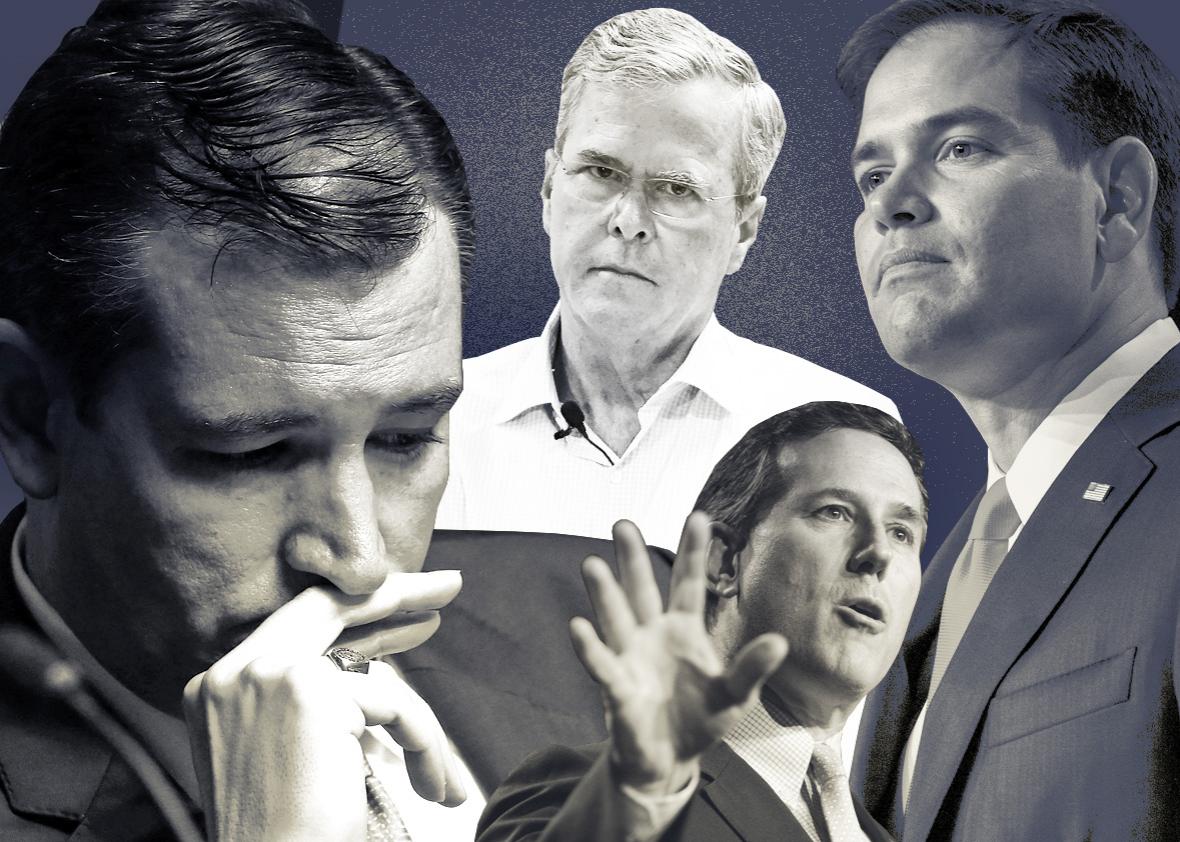Republican presidential candidates and their super PACs have begun 2016 by appealing to the primary electorate’s sobriety, despite scant evidence of its existence. Various candidates, with the key exception of Donald Trump, are offering a message of serious leadership, a trait either that too many candidates possess for voters to decide among them or one about which few voters care. The message serves as both a lament over the decidedly unserious nature of the 2015 leg and a hope for a better stretch in 2016: Either voters will come around to valuing seriousness as voting nears, or Trump will be the Republican presidential candidate.
Trump on Monday released his first television advertisement, which can best be described as an actualization of the hilarious thought experiment, What if the archetypical “somber-voiced political ad narrator guy” tried to speak like Donald Trump? It is what it is. The ad will earn exponentially more airtime in free media coverage than the hard-dollar New Hampshire buy allots for, reinforcing Trump’s theory that paid media is a waste for a candidacy like his. But it is not the only new message out on Monday.
Gather ’round, family, for the Rick Santorum campaign has scrounged together enough loose change to produce a television ad. It goes after Iowa front-runner Sen. Ted Cruz, who is depicted reading stories to his children on the Senate floor. “Ted Cruz is wonderful at reading children’s fairy tales on the Senate floor,” the narrator begins, even though Green Eggs and Ham is not a fairy tale. “Rick Santorum spent his time in the Senate a little differently.” The ad mentions how Santorum was on the Armed Services Committee for eight years, wrote a law imposing sanctions on Iran, and other superserious things that Iowa voters won’t care about because they like Cruz better. “If you want to protect America and defeat ISIS, Rick Santorum’s your president,” the ad concludes. “Because serious times need serious people.”
One of Cruz’s amply funded super PACs, Keep the Promise 1, released an ad Monday that does to Sen. Marco Rubio what Santorum does to Cruz: Unfairly cherry-picks some footage of the candidate in a lighter moment to prove that he’s not serious enough to be America’s war president. The ad overlays the usual scary footage of armed foreign people with commensurate scary music and asks, “What would Marco Rubio’s leadership look like?” It then shows a clip, originally shot for a dumb Web video the Rubio campaign released in October, of Rubio making his fantasy football picks. Vote Ted Cruz: As president, he will not enjoy a single moment of levity. (Rubio, for his part, attacked Cruz in New Hampshire on Monday for not being serious enough to spend infinite amounts of federal money on bomb procurement or to spy on every American all the time.)
Jeb Bush will also begin running a new ad in New Hampshire on Tuesday. It, too, shows scary pictures of terrorists, over which our man says, “serious times require serious leadership”—almost identical to the lame slogan in Santorum’s ad.
Former Arkansas Gov. Mike Huckabee, like Santorum, is a previous winner of the Iowa caucuses. And Huckabee, like Santorum, is losing pitifully this year as novice candidates like Cruz and Ben Carson suck up Iowa’s social conservative vote. “This has been, of all the election cycles I’ve been involved in, this has been one of the most bewildering,” Huckabee, per the Des Moines Register, said at a Sunday event, “because it’s almost as if the more experience, the more preparation one has had for this job, it’s almost like it’s a detriment than it is an asset.”
Huckabee should feel especially offended, since he has experience as both a longtime governor and a conservative entertainment personality who’s constantly spouting off attention-grabbing nonsense. But his venting of frustration at the oddness of this cycle harkens back to New York magazine’s Jonathan Chait’s description of the process in September, after Wisconsin Gov. Scott Walker dropped out: “The Republican presidential race has appeared to take the form of a kind of reverse meritocracy, in which the candidates with real political accomplishments (Walker and, before him, former Texas governor Rick Perry) are driven out, and novices with strong television skills rise to the top.” This remains the dynamic of the race, as Trump, Cruz, and Rubio, who have zero hard political accomplishments between them, sit atop the field. And Rubio is the least likely of those three to win the nomination, largely because he committed the heresy of almost accomplishing something serious and noteworthy.
What is “seriousness”? It doesn’t necessarily have to go hand in hand with “political experience,” and when political candidates urge voters to select the “serious” choice, they always just mean, “select me.” I would say that “seriousness” connotes an understanding of the job of president and a fluency in major policy issues. What we have this cycle is a front-runner who’s both politically inexperienced and visibly unversed in major policy issues—something that’s hurt Carson, but not Trump.
There must be something the non-Trump candidates see while crafting their messages about “seriousness” that’s not apparent to the naked eye. It’s a message that hasn’t worked this cycle, but they continue offering it. Maybe they’re hoping that once voting begins, voters en masse will think, “Oh God, am I really going to push a button that says ‘Donald Trump’ today?” Or they’ve just got nothing better to suggest. It’s much easier when the electorate cooperates.
